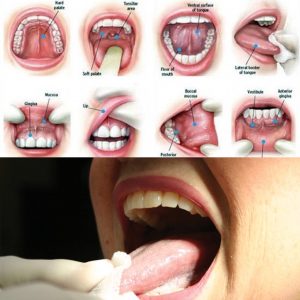Oral Cancer: Early Detection, Diagnosis and Treatment
Cancer that occurs on the inside of the mouth or on the lips is referred to as oral cancer.
Cancer is a disease that starts in our cells. Normally these cells behave in a typical way in which they grow, work together and reproduce and die. Occasionally, some cells get misinformation, behave abnormally and grow and divide uncontrollably. After a while, these groups of abnormal cells form lumps called tumours. Tumours can be classified as benign (non-cancerous) and malignant (cancerous). Benign tumours usually stay in one place in the body and are often not life threatening. Malignant tumours however, are able to invade nearby body parts and spread. When they spread, it is called metastases. This is usually first found by the swelling of nearby lymph nodes. Now that we have an overview of the basics about cancer, let’s focus on Oral Cancer.

Where can Oral cancer develop?
*Lips
*Gums/Gingiva
*Tongue
*Roof of the mouth
*Floor of the mouth
Early Diagnosis of Oral Cancer through the regular screening and early detection is critical. Survival rates are much better when the lesion is diagnosed at an early stage. Checking for the signs of oral cancer is part of a regular dental checkup. I’m sure my patients have noticed me checking with gauze different areas of the mouth such as the tongue (especially underneath and along the side of the tongue) for just this reason. I purposely look inside your mouth as well as check your lips for possible abnormalities. Patients are not just teeth to me. I care about the rest of the mouth too.
What are the sign and symptoms of Oral Cancer?
*Patches that are white or red inside the mouth that do not heal quickly over a few weeks
*A sore that does not heal on the lip or inside the mouth
*A lump or growth on the lip, in the mouth, or on the tongue
*Thickening in the cheeks
*Speech problems
*Lumps in the neck or jaw accompanied with swelling
*numbness of the tongue or lips
*Difficulty swallowing, changes in taste or tongue sensation
What are some of the Risk Factors?
*Tobacco – you knew it, didn’t you? Tobacco smoke contains dozens of known carcinogens (i.e. cancer producing agents). The risk holds for all types and uses of tobacco, including cigarettes, cigars, pipe, smokeless chewing tobacco.
*Heavy alcohol consumption, especially when combined with smoking
*Human Papilloma Virus exposure. If your partner is HPV positive, you may run the risk of getting HPV lesion especially along the lingual and palatine tonsils, soft palate and base of the tongue especially if you engage in Oral sex.
*Prolonged and repeated exposure of lips to sun without using sunscreen. Lip cancer are often seen amongst farmers and outside day workers who have moderate daily sun exposure, or sun worshipers who love to tan.
*Poor diet, genetics and gender. (men tend to develop the disease more than women), and family history of squamous cell carcinoma for instance can predispose you.
*A weak immune system due to medication, disease or transplants
So, in reading the above to prevent Oral Cancer one should:
Stop Tobacco use, drink alcohol in moderation or not at all, eat a variety of fruits and vegetables (the vitamins and antioxidants reduce the risk), avoid excessive sun exposure on your lips & use sunscreen, get your HPV vaccination, and finally most importantly SEE YOUR DENTIST REGUARLY!! We are here to help and detect things at the earliest stage possible. We see you twice a year, more often than other medical clinicians and have the training to diagnose oral conditions including cancer.
Diagnosis and Treatment:
Treatment depends on the severity and location of the disease, as well as the age and health of the patient.
When Oral cancer is first suspected, a biopsy or surgical removal and microscopic examination of the suspicious area may be performed. Imaging such as X-rays, ultrasounds, CT scans or MRI’s might be taken.
Chemotherapy and radiation therapy or surgery may be necessary to remove the tumor or tumors. The overall prognosis will depend on the type and stage of the cancer, the location of the tumour and whether it has spread, your age, and overall health.
